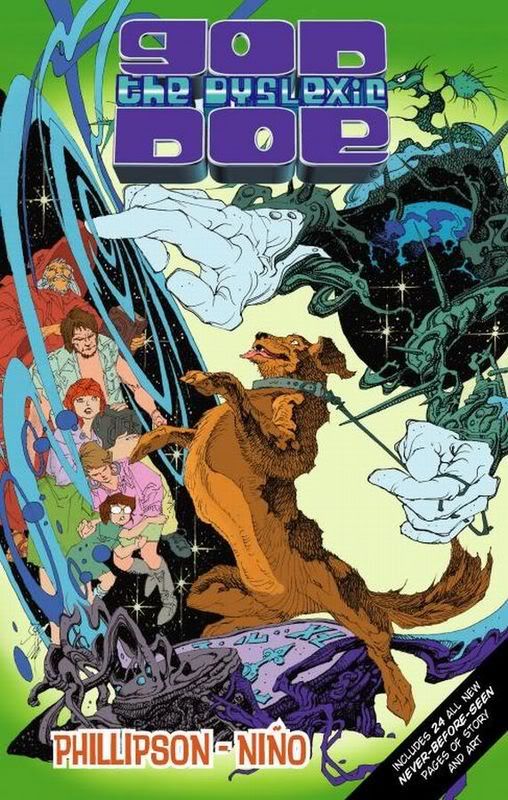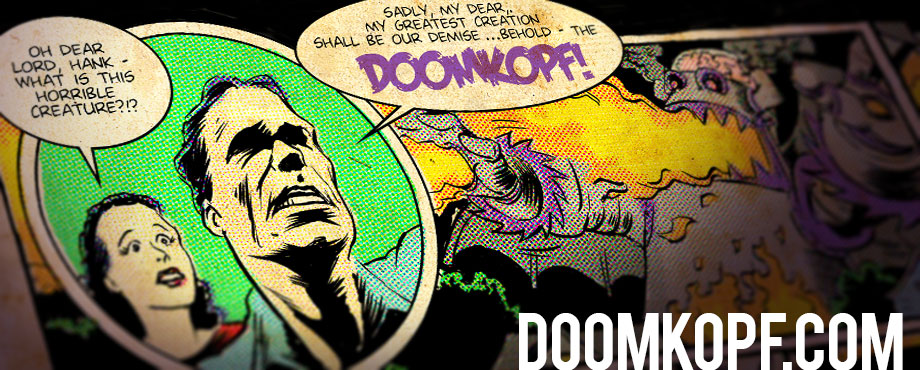Q&A with Brian Phillipson (God the Dyslexic doG)
Alert readers will recall that some time back we brought you a review of the collected series God the Dyslexic doG, which was written by the father-son team of Philip and Brian Phillipson and illustrated by indie comics mainstay Alex Nino. It’s a sort of psychotropic adventure through history, mythology and psychology, heading full barrel for doomsday. And at the center is a dog that’s really god. Or maybe not. There’s a lot left open to interpretation and imagination, which is part of what makes the book such a fun read.
 Co-writer Brian Phillipson took the time to give our readers a bit of the story behind the story, even though he’s swamped at his day job working on the upcoming Futurama series of films. So, without further delay, Brian Phillipson:
Co-writer Brian Phillipson took the time to give our readers a bit of the story behind the story, even though he’s swamped at his day job working on the upcoming Futurama series of films. So, without further delay, Brian Phillipson:
Jean-Claude Van Doom: Most of the first four issues and prequel seem like a setup, establishing this trippy universe and the characters. Yet, the cliffhanger leaves off with the world nearing its end. Do you and your father consider this the feeling out period of the storyline? How much do you have plotted ahead?
Brian Phillipson: The first four issues are definitely a set up for bigger things to come. We wanted to establish this trippy universe first and eventually let the characters interact and play out on it. As far as plotting out goes,we know exactly where it’s going and how it needs to end. Now the fun part comes… the journey to it. From modern day to when the gods were invented is our time line, which gives us a lot of flexibilities and infinite possibilities, story and character wise.
Underlining it all is doG, our hero, witnessing and living through it all.
JCVD: What comic books or other works (fiction or otherwise) inspired the story? The closest thing I can think to compare it to is Sandman, perhaps. And, to look at it from another angle, where does doG fit into today’s comics scene?
BP: The entire Sandman series is definitely an inspiration. The way the stories are slowly laid out against a dream-scape. I admire stories in which you are not exactly sure what everything means at first. You go on guessing at the answers, thinking you’ve just nailed it and then comes the twist. It grabs you and leaves you satisfied. Like Sandman, our story does not focus on one particular superhero or story line. It’s spread out and left open in certain parts to be interrupted by the reader.
As far as where our story fits? I think right in there with the highly literate and the stoner section of the scene. For those looking for something just a little different.
JCVD: This might sound strange, but how seriously does this book take itself, and how seriously do you want readers to take it? Obviously, any time you delve into philosophy, you’re asking for people to pick apart your words and images. Does doG straddle the worlds of serious philosophy and fun adventure romp?
BP: The book takes itself seriously in the sense that Alex, Phil and myself take our work to heart and believe in the story. A lot of blood and time was spent bringing it to life, the very independent route. What I personally like about philosophy is that you can take it pretty much at face value, or go that step further to what may be implied. Both, by what is said and seen at that moment and what comes before and after, as a whole. But in the end, all we want is to tell a good, interesting story. The biggest compliments I’ve personally received regarding the story is that they’ve read it multiple times and found or picked up something new they didn’t catch the first time around and enjoyed the book that much more for it.
JCVD: How much mythology, psychology, philosophy, etc. have you and your dad studied? Any special interests? How worried should we all be about 2011? (When the world is supposed to end in the book.)
BP: I’ve taken multiple classes in mythology, philosophy and psychology, but the main influence has always been my father, Phil, the co-creator of the series. I grew up listening to Art Bell and his conspiracy radio. Taking a pilgrimage to Roswell, New Mexico to visit the ‘alien’ crash landing site. All the books spread around our house that had to deal with the “what if’s” of life… the mysteries of it all. Though I’m more the skeptic, my dad is the main reason why I don’t like to take accepted ideas at face value.
The way things are going now, the world just might end in 2011, but I don’t think it will be because the Mayan Calendar is ending ( I Hope!).
JCVD: Who is your favorite character to write?
BP: Bacchus. An immortal god with a suicidal death wish gives a lot to go on. The idea is not to make him the typical comic book villain. He has many redeemable qualities, the challenge is getting them to shine through despite all he says and does.
JCVD: One character who doesn’t have hardly any dialogue (inner or outer) is doG. Is he the hero? Can you develop pathos with a character who doesn’t speak?
BP: Many have become very famous by having others speak for them. doG doesn’t need to say anything. He’s everything to everyone. The pet of man. A metaphor… wink, wink. Our doG is defined by how the other characters act and react to him.
JCVD: Where would the book be without Alex handling art?
BP: It would probably be a typical looking independent comedy. Alex’s art gives everything an epic quality. He can take you as far as the imagination will go.
JCVD: Any other projects? Adaptations of doG in the works? More issues on the way?
BP: Right now I’m working on a screenplay as well as a TV script for the GTDD. We’ll see what sticks when we pitch. We’ll also continue the series in print, but just in colored graphic novel form from now on. Releasing a book between 120-200 [pages] every year or so.
JCVD: And that’s Brian Phillipson. Many thanks for taking the time.
